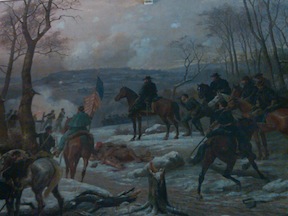Some Context from Donelson for the 150th’s Surrender Season

With the Sesquicentennial’s surrender season nearly upon us, this week presents a good opportunity for us to give upcoming events some context—for it was this week in 1862 that Ulysses S. Grant accepted the surrender of Confederates defending Fort Donelson.
“No terms except unconditional and immediate surrender can be accepted,” Grant said. “I propose to move immediately upon your works.” The clear, simple, unequivocal statement earned Grant the nickname “Unconditional Surrender” Grant, a clever play on his initials.
Now fast forward nearly 38 months.
In April 1865, it fell to Grant to again accept the surrender of a major Confederate army. He had finally shaken Robert E. Lee’s Army of Northern Virginia out of its defenses around Petersburg and Richmond and chased it to ground at Appomattox Court House.
By that point, Grant must have seemed like an old pro, at least in relative terms. He had accepted the surrender not only at Donelson but also, on July 4, 1863, at Vicksburg, Mississippi. His terms there to Confederate Lt. Gen. John Pemberton were, as at Donelson, unconditional surrender—although he loosened his conditions upon reconsideration, paroling 30,000 Confederate prisoners so that he wouldn’t have to feed them.
At Appomattox, “Unconditional Surrender” Grant offered exceptionally generous terms. He offered to let Confederates keep their personal sidearms and horses. Rather than treat them like prisoners or criminals, he simply paroled them and let them go home. And, this time, he fed them, too.
Grant, as general in chief of the entire U. S. army, would authorize his subordinates to offer the same terms to all other Confederate armies in the field. Some, like William T. Sherman, would overstep his bounds and need reigned back in; others, like Edward Canby, would make a few modifications based on specific circumstances. Canby’s Confederate counterpart, Lt. Gen. Richard Taylor, told his men that the spirit of reconciliation ran strong in the negotiations: “All was conceded that I demanded. I demanded all that was necessary or proper.”
Ironically, one of the final surrenders—and the largest one, geographically—fell to Maj. Gen. Simon Bolivar Buckner. It had fallen to Buckner on February 16, 1862, to surrender the more than 12,000 men trapped in Fort Donelson. His superior officers—John Floyd and Gideon Pillow—had abdicated responsibility for the surrender, leaving Buckner, third in command, holding the bag.
In May 1865, Buckner once again found himself holding the bag, abandoned by his superior officer, Gen. Edmund Kirby Smith, who’d fled into the heart of Texas. In his absence, Bucker was forced to negotiate the surrender; Kirby Smith returned just in time, on June 2, to make it official at an on-ship ceremony in Galveston, Texas.
The magnanimity shown throughout the surrender process was all the more impressive because of the shroud Lincoln’s assassination cast over most of them. The generous tone “Unconditional Surrender” Grant set at Appomattox did much to carry peace through.
Grant’s decision to accept no terms but unconditional surrender 153 years ago this month allowed him to treat from a position of strength three years later. That, in turn, made his generosity at Appomattox all the more sincere, giving it the moral authority to carry onward through the surrenders that followed.
Thanks for making this important tie-in. The Sesquicentennial has sort of fragmented the war, as if it were a time line. With the 150th about to end, it will be refreshing to look at points of view such as this to “see” the war with different eyes.